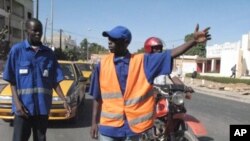The Millennium Challenge Corporation was developed under former President George W. Bush to give U.S. aid to the world's poorest countries on the basis of good governance and growing freedoms. Under President Barack Obama the program has continued, but has been slowed due to budget constraints, a drawn-out transition process and concerns over which countries are getting U.S. money.
Sarah Jane Staats from the Center for Global Development points out the $1.28-billion request for the 2011 Millennium Challenge Corporation budget is the lowest it has ever been.
"I think a few eyebrows have been raised that this year was the lowest budget request since the start of the MCC in 2004, so while there continues to be strong support from the administration, the State Department, USAID, all the members of the MCC board, and several members of Congress, it is a tough budget environment, so it brings up some challenges for the MCC going forward," she said.
Steven McDonald from the Woodrow Wilson International Center for Scholars indicates it took nearly a year to appoint new leadership for the aid body. "And I think one of the reasons why it has not been front and center is because there has been this transition at the leadership level at the MCC and we will probably see it re-emerge," he said.
"It is kind of the same thing with PEPFAR for instance, on the HIV/AIDS, with the transition of the administrations, there was a search for a new director and etcetera, who is in place now and so we will probably see that re-emerge and re-assert itself as an ongoing program. There is no indication anywhere that the administration is going to give less importance to the MCC or to PEPFAR," he added.
PEPFAR, also developed by former president Bush, is the U.S. President's Emergency Plan for AIDS relief. Tanzania recently signed a five-year partnership program with the United States with the goal of reducing new HIV infections.
As far as the MCC is concerned, the 2011 budget is expected to establish new so-called compacts with Indonesia, Malawi and Zambia, and the first repeat compact with Cape Verde.
Officials announced the last major compact with an African country, Senegal, in September 2009, after years of negotiations. The deal was finalized as Senegal opposition leaders boycott talks to improve the country's election system.
Senegal President Abdoulaye Wade and his son Karim Wade are widely accused of corruption, leading many, including Sarah Jane Staats, to look very closely at this program targeted on roads, irrigation and agricultural productivity.
"They have signed a compact. But it has not yet entered into force, which means they have not actually started implementing the programs and distributing the money, and there are certainly some concerns that have been raised about a decline on the indicators, particularly around corruption and political rights so definitely a case to keep an eye on," she said.
Officials from the Millennium Challenge Corporation did not respond to a request for an interview. But on the Internet it has posted a video of its new chief, Daniel Yohannes. He came to the United States as a teenager with very little money, before becoming a successful entrepreneur.
"I have seen poverty first hand and I have also seen the incredible power of opportunity to transform lives," said Yohannes. "MCC's innovative development assistance promotes a global culture of opportunity by reducing poverty through sustainable economic growth. It is that simple and that powerful, poverty reduction through growth."
Despite some challenges, Staats also believes in the MCC system. "The MCC has become very much a model for U.S. foreign assistance in that it has a very clear singular mission and focus on economic growth through poverty reduction in well governed countries," she said.
But McDonald, from the Wilson Center, sees the system of allocating money only to certain countries that meet certain criteria as rigid and flawed.
"We set these criteria. A country has to meet those criteria. It can mean that we are giving a lot of support to a country which for other reasons we might not find as palatable and then we are not giving support to countries which are in early democratic transitions and who do not maybe meet all these criteria who could really use this support and we do not come to their aid. I think there is an inherent weakness in the way that the MCC was set up and the way it proceeds," he said.
More than a dozen indicators establish whether a country sufficiently promotes political, civil and economic freedoms, invests in education and health, uses natural resources wisely, and respects the rule of law.
One of the countries in Africa that had signed a compact, Madagascar, experienced a coup last year that led to a suspension of its U.S. aid. But a 2008 $480-million compact with Burkina Faso, where President Blaise Compaore has been in power since a coup in 1987, and has been widely accused of supporting rebel groups across West Africa, has caused concern among human rights activists.
Thursday, MCC Chief Yohannes will lead a public meeting in Washington about Corporation activities, as well as introduce new senior management members.









